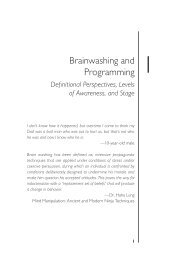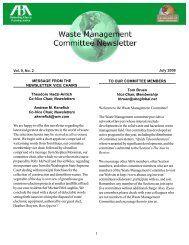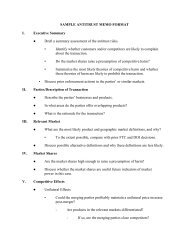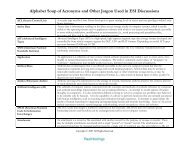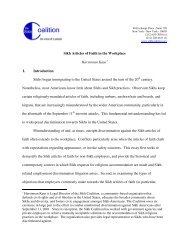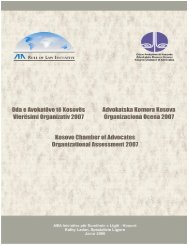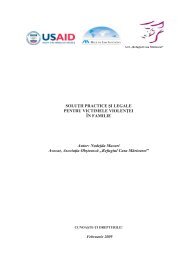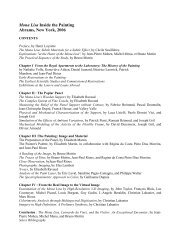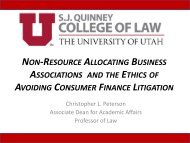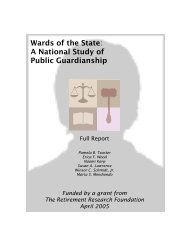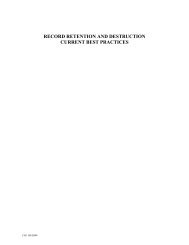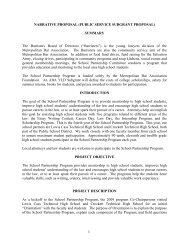Trade Secrets in Employment Relationships in Germany
Trade Secrets in Employment Relationships in Germany
Trade Secrets in Employment Relationships in Germany
Create successful ePaper yourself
Turn your PDF publications into a flip-book with our unique Google optimized e-Paper software.
Carsten Domke LL.M. CMS Hasche Sigle<br />
Example of a Confidentiality Clause <strong>in</strong> an <strong>Employment</strong> Agreement:<br />
"For the duration of his/her employment, the Employee undertakes to hold <strong>in</strong><br />
confidence all bus<strong>in</strong>ess and trade secrets and bus<strong>in</strong>ess events of which he/she<br />
becomes aware dur<strong>in</strong>g the term of this Agreement. This confidentiality obligation<br />
shall cont<strong>in</strong>ue to apply after the term<strong>in</strong>ation of employment with regard to the<br />
follow<strong>in</strong>g bus<strong>in</strong>ess and trade secrets: […]<br />
This confidentiality obligation shall not extend to such knowledge that is generally<br />
accessible or to knowledge the disclosure of which is clearly not detrimental to the<br />
company. In the case of doubt, the Employee shall be obligated to obta<strong>in</strong> a directive<br />
from management on whether a specific fact is to be held <strong>in</strong> confidence." 10<br />
V. Protection of <strong>Trade</strong> <strong>Secrets</strong> Under Crim<strong>in</strong>al Law<br />
<strong>Trade</strong> secrets that are targets of <strong>in</strong>dustrial espionage are protected under crim<strong>in</strong>al<br />
law, primarily by §17 of the Unfair Competition Act and §266 of the German Crim<strong>in</strong>al<br />
Code (Strafgesetzbuch, StGB) and further by §18 and §19 of the Unfair Competition<br />
Act, and also by §202a, §203 and §204 of the Crim<strong>in</strong>al Code.<br />
The key statute <strong>in</strong> practice is §17 of the Unfair Competition Act. Under subsection 1<br />
of this statute, a betrayal of trade secrets by a person employed by the affected<br />
company dur<strong>in</strong>g the term of employment carries a penalty. The offender can thus<br />
only be an employee of the company.<br />
Section 17 of the Unfair Competition Act reads as follows:<br />
"(1) A prison sentence not exceed<strong>in</strong>g three years of a f<strong>in</strong>e shall be imposed on<br />
any employee, workman or apprentice of a bus<strong>in</strong>ess enterprise who dur<strong>in</strong>g the<br />
term of his employment, without authorization, communicates to a third party a<br />
trade or <strong>in</strong>dustrial secret that has been confided to him or made available to him<br />
by virtue of his employment, if he does so for purposes of competition, for<br />
personal ga<strong>in</strong>, for the benefit of a third party or with the <strong>in</strong>tention of damag<strong>in</strong>g<br />
the proprietor of the bus<strong>in</strong>ess.<br />
(2) The same punishment shall be imposed on anyone who, for purposes of<br />
competition, for personal ga<strong>in</strong>, for the benefit of a third party or with the <strong>in</strong>tention<br />
of damag<strong>in</strong>g the proprietor of the bus<strong>in</strong>ess,<br />
1. obta<strong>in</strong>s or secures a trade or <strong>in</strong>dustrial secret without authorization through<br />
a. the use of technical means,<br />
b. the creation of an embodied reproduction of the secret, or<br />
c. the removal of an item <strong>in</strong> which the secret is embodied, or<br />
10 Arbeitsrechtliches Formular- und Verfahrungshandbuch, 9 th ed. 2998, §2 Arbeitsverträge für Angestellte,<br />
Marg<strong>in</strong> No. 25.<br />
L:\JOBS\42179 ABA LEL\42179_Book vol 1\WIP files\Papers\125_Domke.doc<br />
5



